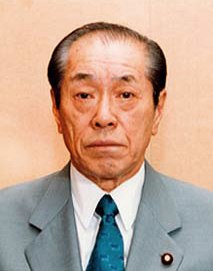Hiromu Nonaka | |
|---|---|
野中 廣務 | |
 | |
| Member of the House of Representatives | |
| In office August 8, 1983 – October 10, 2003 | |
| Preceded by | Shigesaburo Maeo Sen'ichi Tanigaki |
| Succeeded by | Hideo Tanaka |
| Constituency | Kyoto-2 until 1993 Kyoto-4 from 1993 |
| Head of the Okinawa Development Agency | |
| In office January 14, 1999 – October 5, 1999 | |
| Prime Minister | Keizo Obuchi |
| Preceded by | Kichio Inoue |
| Succeeded by | Mikio Aoki |
| Chief Cabinet Secretary | |
| In office October 5, 1998 – July 30, 1999 | |
| Prime Minister | Keizo Obuchi |
| Preceded by | Kanezo Muraoka |
| Succeeded by | Mikio Aoki |
| Minister of Home Affairs and Head of the National Public Safety Commission | |
| In office June 30, 1994 – August 8, 1995 | |
| Prime Minister | Tomiichi Murayama |
| Preceded by | Hajime Ishii |
| Succeeded by | Takashi Fukaya |
| Personal details | |
| Born | October 20, 1925 Sonobe, Kyoto, Japan |
| Died | January 26, 2018 (aged 92) Shimogyō-ku, Kyoto, Japan |
| Political party | Liberal Democratic Party |
Hiromu Nonaka (野中 廣務, Nonaka Hiromu, 20 October 1925 – 26 January 2018) was a Japanese politician of the Liberal Democratic Party.
Nonaka served as a local politician in Kyoto Prefecture from 1951 to 1978 and in the House of Representatives from 1983 to 2003, becoming one of its most prominent members in the 1990s. Nonaka served as Minister of Home Affairs and Head of the National Public Safety Commission from 1994 to 1995, as Chief Cabinet Secretary from 1998 to 1999, and as Head of the Okinawa Development Agency in 1999. Nonaka was widely considered as a voice of reason within the Liberal Democratic Party and viewed by some as the most powerful person in Japan during the mid-to-late 1990s.